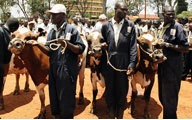
Volunteers Help Build Smallholder Capacity
Interventions in agriculture are crucial to economic growth and poverty reduction in Kenya and Uganda, where over 75 percent of the population works in agriculture and many people are living below the poverty line (50 percent of the population in Kenya, 35 percent in Uganda). Many of these people are smallholder farmers, who produce the majority of the agricultural output but lack adequate knowledge and skills to operate successfully in the marketplace. Small landholdings prevent most farmers from decreasing input costs, reducing risk, and marketing enough products for cost-effective sales, particularly in the regional and international markets. Farmer cooperatives and associations provide the advantage of bulk purchasing and marketing but, in this region, have a history of corruption, poor management, and unsuccessful service delivery. In addition to these problems, constraints along other links of the value chain inhibit agricultural sector growth, adversely affecting farmers.
To address these needs, ACDI/VOCA began implementing the USAID-funded East Africa Farmer-to-Farmer (F2F) program in Kenya and Uganda in September 2003. This program built on ACDI/VOCA’s successful Greater Horn of Africa F2F program, which brought in volunteer experts to provide technical assistance in production, marketing, and general business practices in that region.
Over the course of the five-year East Africa F2F program, ACDI/VOCA sent 160 U.S. volunteers to provide needed technical expertise in the maize, dairy, and horticulture sectors in the two countries. ACDI/VOCA recruited volunteers who have extensive experience in their fields and a genuine desire to improve people’s lives. Volunteers focused on increasing the productivity of farmer organizations; promoting agricultural trade in domestic, regional, and international markets; improving food security through increased production and natural resource management; and increasing the technical and managerial capacity of associations, cooperatives, private enterprises, and nongovernmental organizations.
F2F Impact
In Kenya ACDI/VOCA volunteer Richard Ebert completed an assignment for Olive Farm, Ltd., on mushroom cultivation in August 2007. Students were introduced to the basic biology of mushrooms, cultivation techniques, cultivation parameters and parameter control, post-harvest handling, pest control, basic laboratory procedures involved in spawn production, and sanitation and hygiene. Classes taught by the volunteer were designed to stimulate discussion and encouraged students to extend theories into practice. The students talked about problems confronting them and used their new understanding to discuss potential solutions. Assignment results included higher crop yields and a higher-quality product for the hosts.
In June 2007 ACDI/VOCA volunteer Clare Reece-Glore completed a volunteer assignment to prepare a trainer-of-trainers manual for the Agribusiness Training Centre (ATC) through the Cooperative College of Kenya. Reece-Glore met with several of ATC’s trainers to get their input on a new manual and observed their classes. The manual includes best practices in formal and informal adult education and training methodology suited for agricultural extension training. Reece-Glore also focused on presentation skills, evaluating materials already in use by the host, organizational troubleshooting and writing job descriptions. By the end of the assignment, the volunteer presented ATC with two sets of manuals ready for their trainers to field test. These manuals were written specifically for the trainers at ATC, using their ideas and examples as well as Reece-Glore’s expertise in training and adult education.
In May 2007 F2F volunteer Julie Mazo completed a volunteer assignment with the Bugusege Women’s Cooperative in eastern Uganda. The dairy products marketing cooperative was suffering from serious leadership constraints due to institutional growth. The cooperative needed help streamlining and educating management at all levels and improving members’ capacity to demand accountability. Mazo trained the members in skills focused on leadership, mobilization, group cohesion, participatory planning, how to hold meetings, and reporting procedures. She also helped instill in the members an understanding of the need for accountability to ensure transparency. Mazo proposed a new leadership structure to enhance and reinforce these skills, especially at lower management levels. The cooperative has adopted the leadership structure, and the group’s ability to work together has increased significantly. Meetings are held regularly, and members operate with open communication. As a result, the cooperative has become more efficient and has increased the amount of milk marketed collectively.



